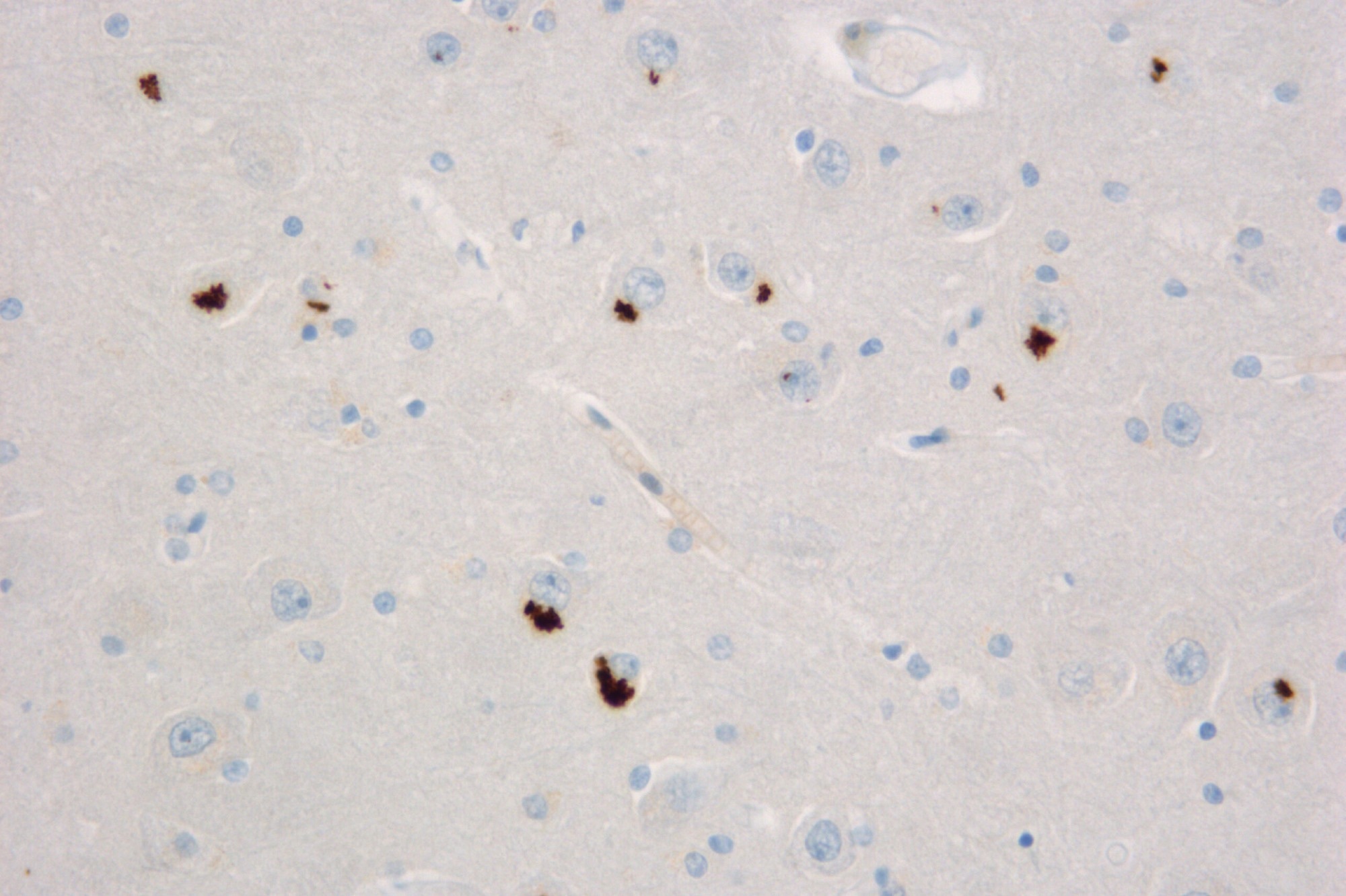DZNE and Intravacc B.V., the world-leading contract development and manufacturing organization (CDMO) of therapeutic and preventive vaccines, have received a grant from the European Union (EIC Transition Grant) of € 2.5 million to further create a prototype ALS vaccine, such as process development, scale-up, and toxicology studies.
 Brain tissue with aggregates of toxic poly-GA proteins (brown) under the microscope. Image Credit: DZNE/Edbauer Lab
Brain tissue with aggregates of toxic poly-GA proteins (brown) under the microscope. Image Credit: DZNE/Edbauer Lab
The project’s goal is to advance the vaccine candidate discovered at DZNE to the stage where it can be trialed in humans.
ALS is a life-threatening neurodegenerative disease caused by protein aggregation in the brain and spinal cord motor neurons, resulting in paralysis and, eventually, death. Some forms of the illness have been linked to genetic mutations. A mutation in the C9orf72 gene causes 5-10% of all ALS cases, making it the most common genetic ALS variant.
Unlike most people, these patients have a vastly expanded repeat region in an otherwise silent part of this gene. Nonetheless, Professor Dr Dieter Edbauer’s research group at DZNE found that these extra sequences are transcribed into toxic proteins, most particularly large, chain-like molecules known as poly-Glycine-Alanine (poly-GA). In mouse models, these molecules cause downstream pathology, eventually causing neurons to die.
An experimental vaccine
DZNE created a test vaccine that directs the immune system to produce antibodies against such dangerous poly-GA molecules. This diminishes poly-GA aggregates in a mouse model and primarily restricts motor deficits. To maintain adequate antibody responses, regular vaccination is needed. In humans, over 2,500 cases of prevailing C9orf72 ALS have been diagnosed in the United States and Europe alone.
This method could benefit an estimated 9,000 mutation carriers who presently have no symptoms but are at risk of having disease within the next ten years. Related vaccine ideas could potentially help patients suffering from a related disease known as frontotemporal dementia.
Before we can test this approach in ALS patients, we need to establish clinical-grade production of our vaccine and do further safety studies. We are grateful that the EU supports this development with the EIC Transition Grant. All in all, we hope that with the help of Intravacc, results from this joint project will advance the broad application of vaccines in debilitating neurodegenerative diseases.”
Dr Dieter Edbauer, Group Leader and Professor, DZNE
Dr Jan Groen, Intravacc’s CEO, says, “There is an unmet need for effective, disease-modifying therapies to treat ALS patients. The goal of our current project is to develop the vaccine to the point where it can be tested in humans. Clinical trials for C9orf72 ALS, which is the most common genetic variant of ALS, are expected to commence in 2025.”
“Our experience in developing similar conjugate vaccines for infectious diseases will greatly accelerate the preclinical development and support the start of the first-ever in human ALS vaccine clinical trial,” Groen added.
About ALS
Amyotrophic Lateral Sclerosis (ALS), the most common motor neuron disease, is a progressive neurodegenerative disorder of the brain and spinal cord that causes progressive paralysis and fatality within 2 to 5 years of diagnosis. ALS typically affects people between the ages of 40 and 70, with men being affected slightly more frequently than women are. There is currently no treatment for ALS. Current treatments can only relieve symptoms, not stop neuron loss and disease development.
ALS is a rare disease with a multifactorial etiology, and its exact pathogenic mechanism is unknown. The cause of ALS is unknown in the majority of patients (85-90%). This condition is known as “sporadic ALS.”
Genetic causes account for 10-15% of ALS cases. ALS genetic variants caused by known mutations, like the C9orf72 repeat expansion, offer a great opportunity for targeted therapy.